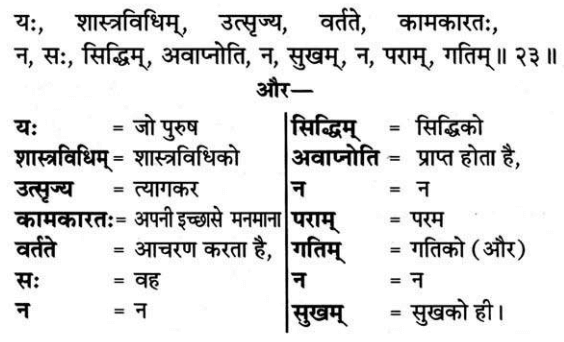Gita 16.23
यः, शास्त्रविधिम्, उत्सृज्य, वर्तते, कामकारतः,
न, सः, सिद्धिम्, अवाप्नोति, न, सुखम्, न, पराम्, गतिम्।।23।।
Gita 16.23
YaH, shaastrvidhim’, utsrjya, vartte, kaamkaaratH,
Na, saH, siddhim’, avaapnoti, na, sukham’, na, paraam’, gatim’ ||23||
Translation: (YaH) he who (shaastrvidhim’) injunctions of scriptures (utsrjya) abandoning (kaamkaaratH) according to his whimsical desires (vartte) acts (saH) he (na) neither (siddhim’) siddhi/perfection/spiritual success (avaapnoti) attains (na) nor (paraam’) supreme (gatim’) state/salvation and (na) nor (sukham’) happiness. (23)
Translation: He who, abandoning the injunctions of the scriptures, acts according to the whimsical desires, neither attains siddhi/perfection, nor supreme state/salvation, nor happiness.
Bhagavad Gita Chapter 16 Verse 23

Essence of Bhagavad Gita Chapter 16 Verse 23
Doing arbitrary worship by ignoring the injunctions of scriptures is futile
Gita verse 16.23 says that those who follow arbitrary way of worship and arbitrary religious practices do not attain any happiness, spiritual powers or supreme salvation. In other words any religious act that is not mentioned in the Bhagavad Gita and the Vedas is useless. This means that mantras like hare krishna, om namah shivaya, jai ganesh deva etc are all futile. Likewise practices such as pilgrimages, ancesteral worship, keeping fasts, celebrating any religious festivals is all pointless. Read 16.24 which clarifies this further.
← Bhagavad Gita Chapter 16 Verse 22 Bhagavad Gita Chapter 16 Verse 24 →